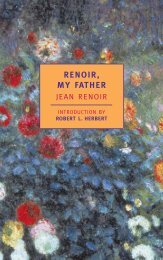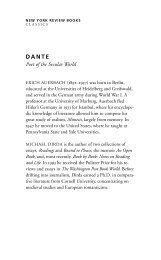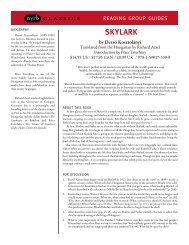THE PILGRIM HAWK: A LOVE STORY
THE PILGRIM HAWK: A LOVE STORY
THE PILGRIM HAWK: A LOVE STORY
You also want an ePaper? Increase the reach of your titles
YUMPU automatically turns print PDFs into web optimized ePapers that Google loves.
nyrb<br />
Glenway Wescott (1901–1987)<br />
grew up in Wisconsin, but moved<br />
to France with his companion<br />
Monroe Wheeler in 1925.<br />
Wescott’s early fiction, notably the<br />
stories in Goodbye, Wisconsin and<br />
the novel The Grandmothers (in<br />
which Alwyn Towers, the narrator<br />
of The Pilgrim Hawk, makes his<br />
first appearance), were set in his<br />
native Midwest. Later work<br />
included essays on political, literary,<br />
and spiritual subjects, as well<br />
as the novels The Pilgrim Hawk<br />
and Apartment in Athens.<br />
Wescott’s journals, recording his<br />
many literary and artistic friendships<br />
and offering an intimate view<br />
of his life as a gay man, were published<br />
posthumously under the<br />
title Continual Lessons.<br />
Michael Cunningham is the<br />
author of six novels, including The<br />
Hours, which won the 1999<br />
Pulitzer Prize in Fiction.<br />
classics READING GROUP GUIDES<br />
ABOUT THIS BOOK<br />
Over the course of a single afternoon in a bucolic country home outside Paris,<br />
Glenway Wescott’s The Pilgrim Hawk captures the awkwardness of social niceties, the<br />
subtle ways a married couple can uplift and betray each other, the tenderness of friendship,<br />
and the complexity of love. The novel’s narrator, Alwyn Towers, an American<br />
expatriate, is visiting his friend Alexandra at her estate when two more of her friends<br />
come over: a well-to-do Irish couple, with a sulking trained hawk in tow.<br />
As the afternoon goes on, Alwyn finds his conceptions about the couple challenged<br />
again and again; though the host and guests try to mind their manners, the truths that<br />
emerge about everyone involved are by turns hilarious and heartbreaking. With a sharp<br />
eye for detail and an unmistakable sympathy for each of his characters, Glenway<br />
Wescott has crafted a beautiful, compact story.<br />
FOR DISCUSSION<br />
<strong>THE</strong> <strong>PILGRIM</strong> <strong>HAWK</strong>:<br />
A<strong>LOVE</strong><strong>STORY</strong><br />
By Glenway Wescott<br />
Introduction by Michael Cunningham<br />
$14.00 US / $16.00 CAN / £7.99 UK<br />
978-1-59017-457-9 paperback<br />
“[In The Pilgrim Hawk] the reader is constantly being repositioned, constantly<br />
being forced to see something he didn’t quite see before. Mr. Wescott’s world is<br />
self-contained but precarious, and, like the real one, endlessly full of meaning.”<br />
—Howard Moss, The New Yorker<br />
1. In the first few pages of the novel, what was your impression of the narrator? Did you<br />
get the sense that the novel begins in the midst of some longer recollection? Did this<br />
technique make you feel close to or removed from the narrator?<br />
2. Alwyn begins attempting to characterize the relationship between the Cullens and Lucy,<br />
the hawk, right away. “Between remarks, in her glances at him, there was affection as<br />
bright as tears. And during the loving fuss she made over the great bird on her arm, she<br />
kept shifting her eyes in his direction, imploring him to try to like it too. It might have<br />
been a baby, and he a lover; or was it the other way around?” [p. 13]. As the afternoon<br />
goes on, does this initial judgment hold up?<br />
3. The Pilgrim Hawk relies on many implicit and explicit parallels between hawk and<br />
human behavior—as when Mrs. Cullen says, on page 27, “I think it must frighten her to<br />
see things higher than she is. We’re like that sometimes ourselves, aren’t we?” How<br />
aware do you think the characters in the novel are of these connections? Why does the<br />
author choose a hawk as Mrs. Cullen’s companion?<br />
4. Did you read the hawk as a sort of additional character, with her own motives and ambitions,<br />
or as a mirror reflecting whatever the human characters happened to project onto<br />
her? What words would you use to describe Lucy?
nyrb<br />
O<strong>THE</strong>R NYRB CLASSICS OF<br />
INTEREST<br />
Apartment in Athens, Glenway<br />
Wescott (introduction by<br />
David Leavitt)<br />
The Cost of Living: Early and<br />
Uncollected Stories, Mavis<br />
Gallant (introduction by<br />
Jhumpa Lahiri)<br />
The Goshawk, T.H. White<br />
(introduction by Marie Winn)<br />
The Go-Between, L.P. Hartley<br />
(introduction by Colm Tóibín)<br />
Irretrievable, Theodor Fontane<br />
(afterword by Phillip Lopate)<br />
The Peregrine, J.A. Baker<br />
(introduction by Robert<br />
Macfarlane)<br />
SUGGESTIONS FOR<br />
FUR<strong>THE</strong>R READING<br />
Evelyn Waugh, A Handful<br />
of Dust<br />
F. Scott Fitzgerald, The Great<br />
Gatsby<br />
Edith Wharton, The Age of<br />
Innocence<br />
Henry James, The Portrait of<br />
a Lady<br />
Ernest Hemingway, The Sun<br />
Also Rises<br />
William Somerset Maugham,<br />
Up at the Villa<br />
classics READING GROUP GUIDES<br />
5. Alex tells Alwyn midway through the book that although Mrs. Cullen is younger than<br />
her husband, financially stable, clever, and interesting, and even though Cullen has<br />
cheated on her, “She devoted herself entirely to him, every instant, year in and year out”<br />
[p. 38]. Why? How do you explain their marriage?<br />
6. When Alwyn realizes that Cullen has been “a little tight all afternoon,” he feels badly<br />
about some of the earlier judgments he made: “No one had warned me that I was not<br />
seeing him at his best… So now I felt a slight embarrassment and grudging contrition,”<br />
he confesses [pp. 57-9]. Why does he feel this way? More broadly, how do his opinions<br />
of Mr. and Mrs. Cullen change as the novel goes on? By the end, does he like them? Do<br />
you?<br />
7. In his introduction to this edition, Michael Cunningham suggests the existence of an<br />
upstairs/downstairs subplot. With reference to Alexandra’s servants, Cunningham<br />
writes: “One imagines they pass through this novel while living out an unwritten novel<br />
of their own, one in which they are the central characters, and the commotion created<br />
by those people in the parlor is important but secondary” [p. xvi]. How does Wescott<br />
hint at this intrigue among the servants? What, through them, might he be suggesting<br />
about class roles?<br />
8. Why does Cullen cut Lucy free [p. 77]? Were you surprised by this action? Why<br />
doesn’t he kill her?<br />
9. After the commotion in the Daimler, when the Cullens attempt to leave the first time,<br />
Mrs. Cullen says “I don’t even know which of us Larry thought of shooting, wife or<br />
chauffeur or haggard” [p. 98]. Which do you think is true, if any? Do Cullen’s actions<br />
throughout the day make more sense when you know about the gun?<br />
10. What did you make of Alwyn’s relationship with Alex? They’re clearly close friends—<br />
did you get the impression that sexual or romantic tension existed between them, or not?<br />
Does knowing about the author’s own sexual identity inform your reading of the book<br />
in any way?<br />
11. Why is the novel subtitled “A Love Story”?<br />
NYRB Classics is an innovative list of outstanding books from many eras and all around<br />
the world. It includes both acknowledged masterpieces and hidden gems of literature with<br />
introductions by distinguished contemporary authors. NYRB Classics offers a wide-ranging<br />
and endlessly surprising selection of books including novels, short fiction, mystery, suspense,<br />
history, autobiography and memoir, and poetry. Visit www.nyrb.com to learn more about<br />
NYRB Classics and to discover, or rediscover, a host of wonderful books.






